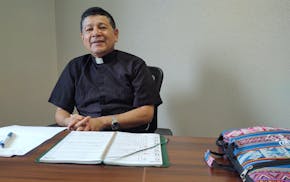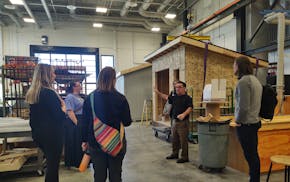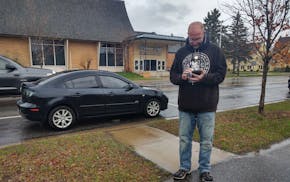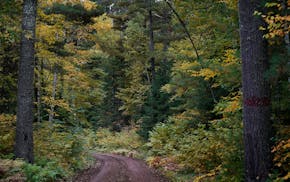CLITHERALL, Minn. — Would I enjoy living in rural Minnesota so much if I wasn't white and straight?
Before you cringe and stop reading, hear me out. I've been thinking about this since writing a column about the ten reasons I'm thankful to live in rural Minnesota. The night sky. The peace. The ability to wear mud boots to Big Foot gas station.
With every sentence, I was conscious that not everybody feels about greater Minnesota the way I do. Some have written to me about it since I started writing this column in May. They aren't white, or they aren't straight, and greater Minnesota hasn't always been kind to them.
So I want to share some of their stories with you. Because underneath everything, we are just human beings who cuss when we stub our toes and go too long between washing the bed sheets and get excited when "Grandma Got Run Over By A Reindeer" comes on the radio.
Don Mercado, 68, born in St. Paul, and second-generation Mexican American, wrote to tell me that his first trips to greater Minnesota were as a young boy in the late 1960s, when he joined his dad and his dad's friends pheasant hunting in the Madelia area in south-central Minnesota.
"Even as a young boy, I knew we were not welcome in many establishments," he wrote. "My Dad was stoic and ignored the stares and comments. We still continued to go because Dad taught us not to limit our lives based on other people's prejudices."
In the late 1970s, Mercado and white friends visited a white friend who was teaching in Melrose. The friend took them to a bar she frequented, but the manager said he wasn't comfortable serving Mercado. They all left.
But like any Minnesotan, Mercado loves the lake country and for more than 30 years he and his wife have stayed in the Nevis and Park Rapids area. Most businesses treat him courteously, but he notices that at times people there treat him differently and wishes he didn't have to think about it at all.
"I will not stop visiting Up North," he wrote. "I am hopeful that things will get better. After all, we are The Star of the North."
Dr. Terri Starkey cracked me up with her tale of four truckloads of men wearing matching bawdy T-shirts crashing her all-female wedding celebration at her and her wife's 125-acre farm in Becker, southeast of St. Cloud. The truckloads were led by their handyman, who thought they were throwing a welcome party.
"I gave a little speech," she wrote. "'Two girls, who are together. If you have an issue leave; otherwise the keg is there.' Most of them stayed."
Yet it was hard to feel a part of things. Even after spending Fridays at the local bar for 12 years, they were still "the lesbian couple." They saw an even meaner side after befriending a local transgender woman.
"She was not someone who understood how to put makeup on — I say this as a card-carrying butch lesbian who could also be accused of this — but it was bad," Starkey wrote. "My wife befriended her and they went out a few times and she tried to help. But the comments. It made my heart ache that people are so cruel."
During the pandemic, Starkey saw people dying, yet people in the Becker bar refused to wear masks and complained about vaccines.
She and her wife decided to move to Duluth.
"I do think America can do better, be kinder, and talk to each other more," she wrote. "But in this current environment of hate and small-mindedness, I'm glad I don't live in Becker/Clear Lake anymore, and that I don't have to be 'the only gay in the village' anymore."
After the election, I received a message from Brent Nelson of Minneapolis, who grew up in rural central Minnesota and who took exception with my column about why greater Minnesota voted for Donald Trump.
Nelson wrote that he refuses to use the term "greater Minnesota" because it implies that there is something better about rural Minnesota. He felt that the reasons people gave me for voting for Trump such as gun rights and grocery prices were "fake polite" answers intended to disguise their real motives.
"They are bigoted transphobic racists — they are just too cowardly to admit it," he wrote.
Greater Minnesota is changing. For seven years, I put together the "Santa" letters for the Echo Press in Alexandria, typing in and formatting all the Christmas wishes sent in by local schoolchildren. Last year, I received my first letter in Spanish. I let it run as it was, knowing how much it would mean to that child's family to see their own language in print. There are also members of the LGBTQ community who live here and aren't hiding who they are.
I hope that as greater Minnesota's demographics change that attitudes can change also. I believe they will.

Tolkkinen: Fergus Falls priest who studied with Pope Leo says he has good hearing 'to hear everyone'

Tolkkinen: Just when I was starting to lose myself in nature's grandeur, along came a motorcycle

Tolkkinen: On a three-day northern Minnesota tour, the grit and glory of our state became clear

Tolkkinen: Brainerd City Council should spend a night, or 30, sleeping outdoors


